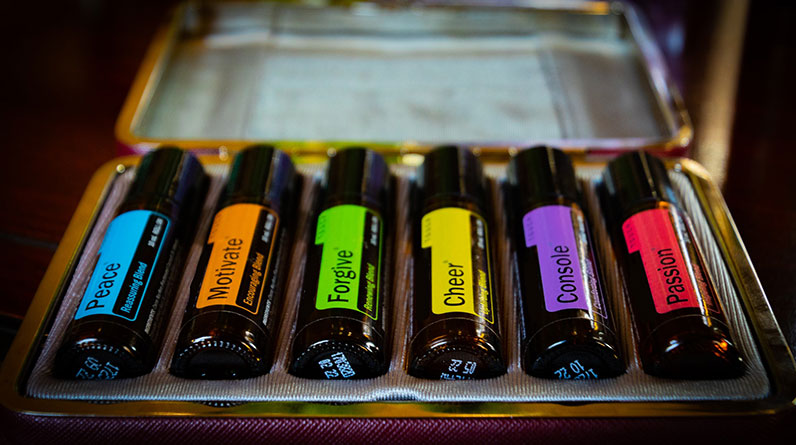
**Affiliate Disclosure**
Please note that some of the links on this site are affiliate links, and at no additional cost to you, we may earn a commission if you decide to make a purchase after clicking through the link. Any commission we make is income for the work put into supplying the information presented on this website.
.
Boosting Immunity
If you’ve ever been sick, you know how important it is to boost your immune system. Fortunately, you can easily do this with essential oils!
Essential oils contain antibacterial, antifungal and antiviral properties. They can also improve blood flow and aid digestion, all of which contribute to stronger immune systems.
Eucalyptus
Eucalyptus essential oil is a powerful antimicrobial that can help fight germs, viruses and fungi. It can also reduce redness, swelling and pain and speed up wound healing. This makes it ideal for treating a number of skin issues including blisters, blemishes, cold sores, insect bites, shingles, dermatitis and cuts.
Eucalyptus oil is also a natural expectorant and can help with congestion in the nose and chest. It is also used to improve ear infections, especially those caused by a build-up of fluid in the ear canal. It can also be applied topically to relieve respiratory symptoms and may help reduce the duration of colds.
It has antiviral and antibacterial properties that can be beneficial for preventing a variety of respiratory illnesses, such as the flu, measles, and chickenpox. Additionally, it is a natural immune stimulant that can help you feel more alert and energetic, which can increase your overall well-being.
You can use eucalyptus oil aromatically to boost your immunity or as a topical application for the entire family. You can add a few drops to your diffuser or mix it with a carrier oil and rub onto your throat. It can also be applied to a cotton ball and placed on your pillow at night to help you sleep better.
Aside from helping boost your immune system, eucalyptus oil can also help reduce stress. Research shows that eucalyptus can help reduce stress-related hormones in the body, such as cortisol. It is especially helpful for those who have anxiety, insomnia or depression.
In addition, it can help lower blood pressure and increase circulation, which can prevent further complications from heart disease or strokes. It can also help regulate the nervous system and balance the body’s temperature.
It can also help with respiratory problems such as coughs, colds and the common flu by reducing inflammation. It has also been shown to ease sore throats and hoarseness when mixed with other oils.
Before applying eucalyptus to your skin, it’s important to dilute the oil with a carrier oil. You can also combine eucalyptus with coconut oil and apply it to the affected area.
Lemon
Lemon essential oil is extracted from the peel of the fruit and has an uplifting and fresh aroma. It is also known for its cleansing properties and can be used as a dilution in a massage blend to increase circulation and stimulate the immune system.
It can also be diluted in a relaxing bath to moisturize the skin, relieve fatigue and flu symptoms, boost energy and metabolism, enhance the mood and generally tone the body. This can also be a good ingredient in cosmetic beauty products, such as face washes and lotions, to help refine the complexion and reduce the appearance of cellulite.
As an antioxidant, lemon essential oil has a high content of Vitamin C, which helps to improve the function of the immune system by stimulating the body’s ability to fight off infections and toxins. It also has antiseptic and astringent properties that can help to rejuvenate dull and tired skin.
Various studies have shown that lemon essential oil can promote a healthy immune response by supporting the innate immunity of the body through its antibacterial, antifungal, and antiviral properties. In addition, it has been shown to help to reduce swelling in the lymph nodes and bolsters the respiratory tract.
One study found that a combination of lemon essential oil and silver fir essential oils diffused into the air in hospitals helped to decrease levels of bacteria and fungus in the air, which can be a contributing factor to common illnesses such as colds and coughs. It also reduced oxidative stress, which can increase cellular damage and can lead to illness.
Additionally, it is known to have a positive effect on the digestive tract and has been shown to aid in reducing constipation. This can help to prevent the development of gastrointestinal problems such as diarrhea.
It is important to note that although lemon essential oil has many beneficial effects, it should not be used in large quantities without the proper dilution and care. It can cause irritation to the skin if applied directly without a carrier oil, so it is recommended to test it on a small area before use.
Tea Tree
Tea tree essential oil is derived from the leaves of Melaleuca alternifolia, a small tree native to Australia. It’s an antibacterial, antifungal, and antiviral essential oil that can help boost your immune system and protect you from colds and other infections.
The main chemical compound in tea tree oil is terpinen-4-ol, which has been shown to be effective against bacteria and fungi. This makes it an excellent natural treatment for several common health issues including acne, athlete’s foot, and nail fungus.
It also helps reduce inflammation and promotes faster healing of wounds. You can apply it to fresh wounds, as well as to irritated skin to get relief from itching and discomfort.
Dilute it with a carrier oil and use it topically to stimulate your immune system to fight off infection. You can also diffuse it in the air to help relieve respiratory ailments, such as bronchitis and the flu.
You can also apply diluted tea tree oil to minor burns, cuts, and sores for pain relief, a decrease in bleeding, and the elimination of bacteria. It may also be used on insect bites and stings to prevent the spread of harmful organisms.
It can also be applied to the scalp to treat dandruff and lice. However, there isn’t much scientific research on this topic.
As with any essential oil, it is best to talk to your doctor before using it if you have any health concerns. This is especially true if you’re pregnant or breastfeeding, as it can have negative effects on your baby.
Another thing to keep in mind is that if you are allergic to any of the ingredients in tea tree oil, you should avoid it. Because it contains terpenoids, it can cause allergic contact dermatitis in some people.
The most common side effects of tea tree oil include irritation and redness, but you can expect to experience these symptoms within a few weeks after starting to use it. You can prevent them by limiting your exposure to the essential oil, if possible, or diluting it with a different oil before applying it to your skin.
Lavender
Lavender essential oil is an excellent natural way to boost your immune system. It contains anti-inflammatory and antimicrobial properties, making it effective for reducing inflammation and fighting off infection. It also helps prevent and reduce itching and redness from insect bites.
The flowers of the lavender plant have microscopic glands that secrete oils into their petals and leaves. These oils are then captured during a steam distillation process, which is what gives them their unique floral scent.
One of the best ways to use lavender essential oil is by adding a few drops into an aromatherapy diffuser. You can also apply it to your skin and hair by mixing it with a carrier oil. You can also try a combination of lavender oil with other oils, such as cedarwood or frankincense, to create a soothing blend that will help you unwind and relax.
Another great way to use lavender essential oil is to make your own homemade lotion. Mix a few drops of it with coconut oil or other natural skin moisturizer to create a deeply nourishing treatment for your dry, aging skin.
You can also add a few drops to your bath water for a relaxing and immunity-boosting soak. You can also use lavender in cooking, as it can be used to flavor recipes like grain-free muffins and teas.
Using lavender essential oil in your home can help purify the air. Its natural antimicrobial properties can fight off a variety of bacteria, viruses, and other microorganisms.
In addition, it can help reduce stress and anxiety. It can also help you get a good night’s sleep by calming your mind and body.
It can also be a powerful anti-inflammatory, making it effective for treating aches and pains and helping you fall asleep faster. Its anti-fungal and antibacterial properties can also be helpful for those suffering from psoriasis and eczema.
The chemical composition of lavender essential oil determines its anti-microbial activity. It has a high concentration of monoterpenes, including linalool and linalyl acetate, which can be effective against a variety of bacterial species.
In conclusion, essential oils can be a powerful tool for mental clarity and focus. Orange essential oil is great for lifting mood and reducing stress, while lemongrass essential oil helps relieve stress and anxiety. Basil essential oil is popular for its ability to lower fatigue, anxiety, stress, and nervousness, and peppermint oil helps to stimulate the area of the brain that controls learning and memory. By incorporating these essential oils into your routine, you can unlock your potential and experience increased mental clarity and focus.


